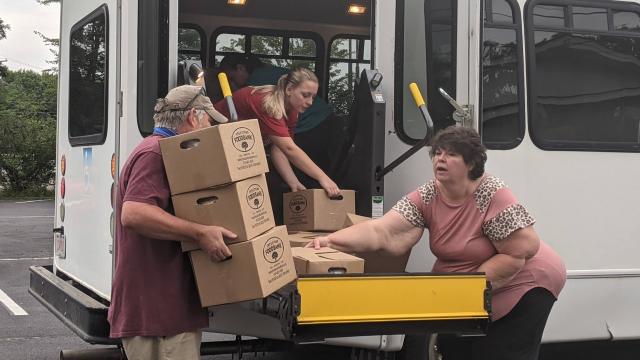Moira's Message: Responding to Community Need

CINCINNATI (June 21, 2022) —
Dear United Way friends,
We have always known the nonprofit system of care provides critical services and resources that help families respond to crisis and buffer the impact of hard times. That was reinforced over the past two years as nonprofit and community groups mobilized to meet community needs – helping families access basic needs, connect to COVID testing and vaccines, navigate virtual services and access public assistance.
Still, despite all the resources in our community and coordination efforts, many families were and are still unable to access support they need at a time when they need it most.
As we have listened to community members, a common theme is the lack of access to, and coordination among, community resources. People either did not know what was available, could not easily access what was available, or ultimately were provided something that didn’t actually meet their need.
Just recently, I sat down with Seante, a local mother in Cincinnati. She shared these same frustrations with me.
“The first time that [a provider] asked me what I needed help with, I couldn’t answer. It was frustrating because I needed everything. Other times, when I could share what I needed, I’ve been told that I can’t have it. Eventually, I just stopped asking. I didn’t want to keep hearing no.”
We want fewer families to experience what Seante encountered when accessing help. We are investing $1,575,000 to spur systemic change in the nonprofit sector.
Our Responding to Community Need portfolio will bring together 18 partners to build, test and advance new solutions that improve the effectiveness of the nonprofit system of care when responding to community needs. These partners will also explore efforts to improve alignment between other systems families regularly engage with – such as health care and public benefits. We want to ensure people can access the right services at the right time. And, we intend to center community voice and data-informed approaches as we advance new solutions.
Post-pandemic, many nonprofit organizations operate with limited capacity and increased demand. Let’s see this as an opportunity to strategically learn and improve together. We want to better coordinate and share learnings and innovations broadly. Not only can this help build new coordination practices and improve service delivery, but it can inform opportunities to address root causes. While it is critical to provide individual services in times of need, building sustainable economic well-being requires systems change and nonprofits also must look upstream for solutions that address root causes.
Our region is home to more than 1,800 nonprofit organizations, as well as numerous smaller, grassroots and faith-based groups providing community services. While the region is rich with resources, the traditional nonprofit system is complex and fragmented. Those who need help often have difficulty navigating, especially people living with chronic mental illness or serious health conditions, and unaccompanied youth. COVID-19 exposed this, with many passing on seeking assistance at bigger, traditional nonprofits in favor of trusted entities within their local community, such as local places of worship, schools and community groups.
This new portfolio of partners is intentionally diverse, composed of well-branded organizations, smaller and more niche partners, and partners with broad networks of relationships that include grassroots and faith-based organizations. We want to ensure a spectrum of perspective and expertise informing the work.
We also intend to continue to infuse community voice. Co-creating solutions with those who have lived experience in poverty and inequitable opportunities is another way to improve service delivery and address root causes. And, United Way researched areas for investment through conducting interviews and surveys, as well as holding focus groups with more than 400 individuals and 200 organizations. From our research, we learned participants prioritized engaging community stakeholders in developing and implementing new community solutions by:
- Provide opportunities for community members to be part of the design, decisions and/or implementation solutions (59%)
- Increased opportunities for families to guide improvements in social services and educational systems (24%)
- More use of family feedback to determine how to change or improve programs (23%)
- Innovative approaches designed with community members (22%)
We are challenging our Systems Change partners to inject community voice into any solution that increases collaboration and accessibility. Those closest to the challenges are best equipped to develop the solutions.
Sincerely,
Moira Weir
President/CEO
United Way of Greater Cincinnati